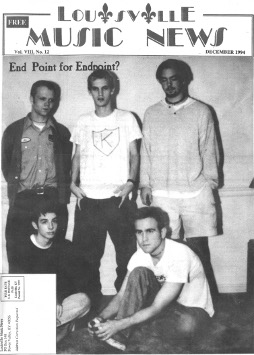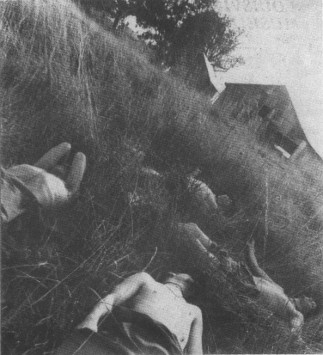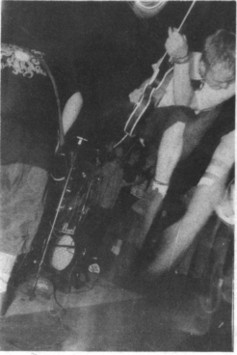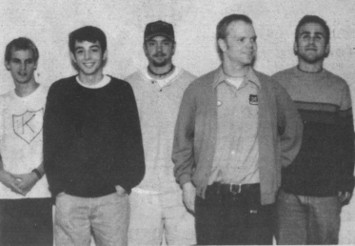social bookmarking tools:
 |
|
| Available RSS Feeds |
|---|
 - Top Picks - Top Picks |
 - Today's Music - Today's Music |
 - Editor's Blog - Editor's Blog
|
 - Articles - Articles
|
Add Louisville Music News' RSS Feed to Your Yahoo!
|

Endpoint
Bya Darrell Ray Elmore
"Do you think the solitude in which I live has a more amusing decor than any other solitude? Do you think it is any nicer for remembering that there were times very late at night when you and I shared our aloneness?"- F. Scott Fitzgerald
This story begins over a decade ago. It was a time in Louisville when punk rock had finally established a base. It had taken almost a decade for the sensibilities of acts like The Sex Pistols, The Clash, and The Ramones to filter down to the lowest common denominator- the Midwestern teenager with a garage, a skateboard, and a beat-up six-string electric guitar.
Ten years ago, a retired caterer named Charlie Butterfield opened a small pizzeria on Bardstown Road. It was approximately a half block from Tewligans Tavern, a club that at the time was alone in its ability to provide original music, performed by up-and-coming rock bands that had yet to prove their commercial viability. MTV was in its infancy, Madonna was still "Like a Virgin," and the punk youth of Louisville gathered at Charlie's Pizzeria.

Charlie's hadn't started out as a "punk rock pizzeria," but the old man's genuine affability and generosity, and his staunch refusal to treat a 14-year-old girl with a purple mohawk any differently than the rest of his widely varied customers made him and his restaurant the perfect haven for the punkers. Plus he served pizza, a definite mainstay of the rock-and-roll diet. As many said, "You'll never go hungry as long as there's Charlie."
Duncan Barlow was one of those punks.
Duncan's sister was a proto-punk. She listened to the new wave stuff, with a little hard-core thrown in, and Duncan, being exposed daily to the screaming rants and raves of angst-filled music, found himself, like many his age, identifying with the pain-filled lyrics and music. And it was sooo cool.
Here was a group to which one could belong without the trappings of other teen-age cliques- you didn't have to excel at sports, didn't have to drink beer or do drugs, could dress weird- all without any form of retribution. Unlike the strict, organizational breakdown of popular kids and nerds that is the norm in high school, the punk scene embraced weirdos and malcontents and held the banner of being "different" high . . . plus, for the most part, one could be a nerd - albeit a nerd with green hair- and no one would know the difference.
Somewhere in the middle of all that fine, loud, screaming music, Duncan distinguished a lyric about skateboarding. That sounded just fine to Duncan. He went to Pro-Quality Skates, bought himself a nice big skateboard festooned with the appropriate punk decals, and started "shredding" up and down Bardstown Rd.
Used to be you would see lots of these young punks skateboarding their lives away up and down "The Road," but now the boards seem to have fallen into disuse and more and more you see these types of kids hanging out in front of coffeehouses (which were nowhere to be found in the Louisville of a decade ago). It was during this time that the famous local punk act Malignant Growth changed their name to the more reserved Fading Out, and bands like The Uninvited and Maurice began to play at Charlie's Pizzeria. This was all well and good for Chuck, as the punks had pretty much scared away his regular clientele, and the shows produced just the kind of capital needed to fill the gap.
Maurice held sway, with the infamous Sean Garrison (Rat) singing and the nefarious Mike Bucayu on bass. Bucayu was something of a legend, his name featured in graffiti around the Highland's in statements like "Mike B. IS punk rock." In fact, it was Mike who sold Duncan his first guitar.
Unfortunately, the punk regulars also intimidated the patrons of Charlie's next-door neighbor, Jack Fry's, and that prestigious establishment put pressure on Mr. Butterfield to the extent that they finally bought him out, and punk rock was once again relegated to Tewligans and whatever rental hall was willing to put up with the noise and inherent vandalism that often accompanied the boisterous punk scene.

Like Charlie's, Fading Out did just that, and Mark Abromavage (Fading Out's guitarist) was to link up with both Garrison and Bucayu to become the omnipotent Kinghorse, and in that self-same stroke took the lead in Louisville's all-ages scene.
Duncan was playing with Jon Cook (of Crain) in the band Substance when he linked up with Rob Pennington (vocalist for the low-profile band Fist), and together they struck out on their own (rumor has it that Duncan was booted from Substance because he was too "metal"). At first, they called themselves Deathwatch, and under that name they played for about a year and a half. With that experience under their belt, they rechristened the band Endpoint . . . the rest is history.
For a time, Endpoint and Kinghorse reigned supreme, drawing audiences of 1200 to 1500 (all-agers, no posers) to their shows- in fact, both bands found it more commercially viable to play separately (even though they did share the stage in the beginning) rather than on the same bill- as more money was garnered than if they played together. Taken separately, the differences in the two bands is apparent. Kinghorse dwelled in that first-order world of punk, one in which pure hate is the necessary fuel, whereas Endpoint, probably due to Duncan's own roots, followed more of a straight-edge path, one that hopefully brings the participant to a higher level through the helping and understanding of others. Duncan and Rob, although influenced by the earlier and older angst-ridden message of punk, were looking for a way out, and wanted to take as many of their fans with them as possible.
Indeed much of Endpoint's music deals with issues of the day; animal rights (both Rob and Duncan are professed vegans, the radical forefront of vegetarianism in which neither meat nor any form of dairy product is consumed), rape, sexism, suicide, drug use, etc, etc.
During the years of the Kinghorse vs. Endpoint competition, many of the fans found themselves split- indeed it was more the fans than the band members themselves who perceived any sort of competition at all. In fact, Endpoint took pains to cover one of Fading Out's songs as tribute to the old-line rockers. Even still, it wasn't until Kinghorse's breakup in 1992 that all eyes in the punk scene turned to Endpoint, and the responsibility to keep the scene going fell upon their shoulders.
And keep going they did, touring Europe twice, playing innumerable local shows, and releasing four major records and a slew of 7" and 10" singles. Today, Endpoint stands on the brink of major-label success #ÿ but like many local bands, just as they seem to be hitting a groove, they are planning to call it quits.
"Love kills." - Joe Strummer
"Well Mr. President, I'd like to hold off judgment on a thing like that until all the facts are in."- Peter George, Dr. Strangelove
"And she'll have fun, fun, fun 'til her daddy takes the T-bird away." - The Beach Boys
I met briefly with both Duncan Barlow and Rob Pennington at Zetti's on Bardstown Road. I had met neither of them before this, but had on occasion seen Duncan at various shows about town, and I was also familiar with his all-ages scene report column in LMN. I had also seen him innumerable times at Charlie's Pizzeria, back when I worked at that fine establishment (I made the best peanut butter pizzas in town, although Wayne Piatt and Chris Abromavage might argue with that fact). Duncan looked older than I remembered, and indeed he has grown much since then. I was struck by the politeness and openness which both young men displayed at this meeting, although I could tell Mr. Pennington was a little nervous (no more than me, I am sure).

Duncan is currently majoring in English at the University of Louisville, with an eye towards teaching at the college level, whereas Rob is immersed in training to become a counselor for people with Downs Syndrome, as well as other mentally challenged individuals. The underlying philosophy of Endpoint (the band) can be summed up by both Duncan's and Rob's goals in life, mainly the helping of other people to achieve their own goals.
Interestingly enough, and hand in hand with this philosophy, is the absolute lack of ego with which Duncan and Rob perceive themselves, and their place in the music industry. Here we have two young successful musicians who have never wavered in their pursuit of higher learning- it is obvious that the music is a big part of their lives, and yet, not as all-encompassing as one would think. It is not often that you find truly successful musicians who undeniably throw themselves into their craft, and yet have reserves for the needed concentration and dedication it takes to earn degrees in fields outside of music.
To say I was impressed is an understatement. There was a duality here that was almost magic; both Rob and Duncan have almost singlehandedly changed the direction of punk rock from emphasizing the negative into glorifying the positive. The message in their music is clear; not "kill your parents, hate everyone" but more "try to do right, you will be better for it."
If, as Duncan stated during our interview, "Punk is dead," then Endpoint has had a hand in it, or at least have served as pallbearers at the funeral.
Of course, punk is not really dead, and I challenge anyone who listens to an Endpoint CD to say otherwise- the music itself still contains the same fury, the same pounding ferocity as that which came before. It is the lyrics that make Endpoint different.
"We made it all right for guys to not just be tough guys all the time," stated Duncan, in an offhanded way. No mean feat. Now if they could just get the kids to quit tearing up venues.
Still, Endpoint's mission has spawned a wide range of followers, not a few who are mixed-up teenagers with more hormones than answers.
DISCOGRAPHY
Full Length
1. IF THE SPIRITS ARE WILLING - Slamdek Records - 1989
2. IN A TIME OF HATE - Doghouse Records - 1991
3. CATHARSIS - Doghouse Records - 1992
4. AFTERTASTE - Doghouse Records - 1994
Singles
1. CRAIN/DEATHWATCH 7" - Slamdek Records - 1990 (rare, out-of-print)
2. SUNSPRING/ENDPOINT - Slamdek Records - 1991 (out-of-print)
3. EP2 - Break Evenpoint Records - 1992
4. IDIOTS - 4 covers, including Malignant Growth's "Circus of Pain"
5. RITES OF SPRING - out-of-print
6. 26 SECONDS - self released - only 300 copies
7. ENDPOINT/SUNSPRING - Rick Springfield Cover Disc - Slamdek - 1994
"I mean whatta ya do when some kid writes you a letter asking you why he shouldn't commit suicide?" lamented Rob. "I usually end up telling 'em to watch Star Wars a couple of times."
Pennington, who has been described to me as "the most innocent guy in the world," is a Star Wars fanatic, and sees himself as a kind of "Jedi Knight." Having grown up in the saccharine-sweet age of Lucas/Spielberg-everything-always works-out-in-the-end myself, I could understand this young man's fascination with the endless battle of good against evil. Of course, both young men know that good does not always win . . . but that doesn't mean you shouldn't at least try- go ahead and fight the good fight as it were- and in the end hope that your efforts have not been in vain.
Indeed it was obvious to me during our meeting that both Barlow and Pennington operate on a higher plane than most- but I am not saying they are not without business wiles. Duncan expressed regret over having to get ugly with club owners from time to time, but as he put it, "We just couldn't have them collecting thousands of dollars at the door and paying us a couple of hundred. We're not greedy, but we want things to be fair."
When I asked why there was not a stable all-ages venue in Louisville, both Rob and Duncan looked disgusted and complained that the police "hate the kids, period," but both were ready to agree that some of the responsibility lies in the hands of the kids themselves. I got the feeling that both would like to see the more rambunctious element of the scene weeded out. In fact, both agreed that many of the "brawlers" were not as prevalent as they were just a few short years ago.
Still, the punk ethic is deeply ingrained, and even though both Rob and Duncan are decidedly non-violent, I could see their eyes light up as they recounted old war stories and touring anecdotes.
"We were playing this show," said Duncan, "and these kids were all over us, right up on the stage. Our guitarist, Chad, was getting pretty p----- and just slammed this guy with his guitar, I mean really slammed him. I mean, we all thought it was just terrible at the time, but when you see it on the video, well, it's pretty funny now."
He also related experiences in Europe, where playing in front of poverty stricken kids, Duncan was appalled by one of the other band's (whom they were touring with) road manager hawking of over-priced T-shirts.
"I kept cutting the price of our shirts, you know, because I felt bad that these kids were buying them when they obviously didn't have the money. This guy kept yelling at me 'cuz our shirts were like half of what he was selling his for, and all the kids were buying ours and not his. I kept scratching out the price on our sign and marking it down, laughing at him and saying, 'Is this what you want? Huh? Is it?'"
Again, another example of Endpoint's reverse punk mentality. Or perhaps this is actually more straight-ahead punk than it first appears; the taunting of the greedhead corporate mentality with the freedom that the punk ethos carries with it.
Both Rob and Duncan were obviously grateful that their success had afforded them the chance to see Europe, even though between them they exploded many of the myths that are circulated about the old world.
"You know, people always say, 'Yeah, European kids get to drink all the time, there are no age limits so they can handle it,'" said Rob, "But that's a lot of crap . . . a lot of (those) kids were just plain drunk!"
As I said before, both Rob and Duncan lean more towards sXe (straightedge, i.e. no drugs, no meat, no alcohol, no exceptions- a la Henry Rollins), yet they definitely do not define themselves as straightedge, nor do they lambaste those who do not follow in their beliefs. They practice what they preach, but seem to think that tolerance of others is the key to all things.
Endpoint's music is often described as "emo," short for emotional, and evidently their stage shows often reflect this. Several sources report that onstage, Endpoint is sometimes so explosively emotional with their performance that the technical side of the music suffers. Judge for yourself. Endpoint will play their last performance on Dec. 30 at the Brewery's Thunderdome.
When I asked why the band was breaking up, there was a pause, then came the reasons. More than anything, the band does not want to fall into the ugly position of becoming parodies of themselves. They feel that they have done what they set out to accomplish with the present lineup (Duncan on guitar, Rob on vocals, Chad Castetter on guitar, Benny Clark on bass, and Kyle Crabtree on drums) and are ready to move on. Certain sources from within the scene say that the band to watch for next is Falling Forward (of which Benny Clark is a member), but I would not discount the rest of Endpoint just yet. Duncan is planning to focus more of his energy on his side project, the band Guilt, and Rob claims he is looking to get into some "serious experimentation." At the moment, there are plans for a "Farewell" 10"' single, to be released on the night of their last show (Dec. 30).
Special thanks to both Greg Wells and Mark Abromavage for providing information for this article.
Darrell Ray Elmore is a freelance writer living in the Highlands. He is a regular contributor to LMN and editor/publisher of the HARD TIMES.
